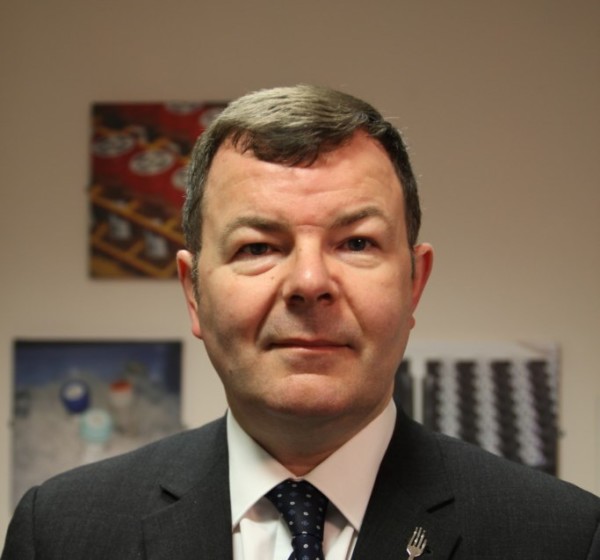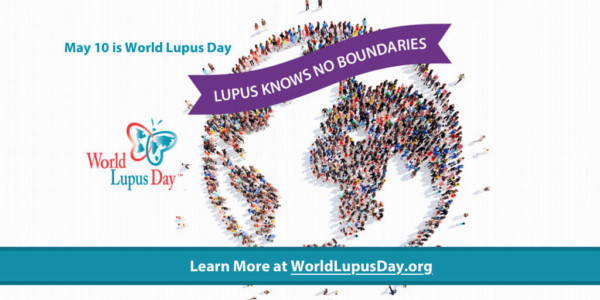Spotlight on Lupus – the ‘disease of a 1,000 faces’
World Lupus Day (10 May 2019), sponsored by the World Lupus Federation, calls attention to the impact that Lupus has on people around the world.
The day focuses on the need for: improved patient healthcare services, increased research into the causes of and cure for Lupus, earlier diagnosis and treatment and better epidemiological data on Lupus globally.
On this important health awareness day, we talk to NIHR Manchester BRC Director and Lupus specialist, Professor Ian Bruce, about the disease and the work going on in Manchester to improve outcomes for patients.
Firstly, what is Lupus?
Lupus is a long-term autoimmune disease in which the body’s immune system becomes hyperactive and attacks normal, healthy tissue. The most serious and common form of Lupus is SLE (Systemic Lupus Erythematosus).

Who can get Lupus?
Lupus principally affects women (9 out of 10 patients are female), with the highest risk for onset of SLE during childbearing age. It is also much more common in people with African, Chinese or Indo-Asian ancestry.
Studies have shown that Lupus affects approximately 1 in 4,000 adults in the UK. We estimate that there are over 1,000 people with Lupus in Greater Manchester and, in the Kellgren Centre for Rheumatology, a Lupus UK Centre of Excellence based in Manchester Royal Infirmary, we see about 400-500 Lupus patients a year from across the North West of England.
What are the symptoms?
Lupus can be a very serious, even life-threatening, illness. Symptoms include debilitating fatigue, inflammation, swelling, and damage to the joints, skin, kidneys, blood, heart and lungs. A butterfly-shaped facial rash is also a hallmark sign in SLE. Early diagnosis can be difficult due to the non-specific symptoms.
There is no cure for Lupus, but symptoms can be controlled with the right treatments.
Why is Lupus called the ‘disease of a 1,000 faces’?
This is because its symptoms vary so much from person to person. They also change and evolve over time and Lupus can also mimic so many other disorders.

What is NIHR Manchester BRC contributing to research on Lupus?
Our Lupus research programme has been going for over 20 years and one of the Musculoskeletal Theme programmes in our BRC focuses on Lupus and related conditions.
In one study we are using imaging and cognitive assessments to stratify key subsets of cognitive dysfunction (brain fog) in Lupus and piloting a more personalised approach to improve cognition. A recent paper on this work was published in the Annals of the Rheumatic Diseases, the best international rheumatology journal.
Our other major programmes seek to develop and better understand new therapies for SLE. We are focused on trying to better define the underlying types of inflammation in our patients and, also, to see if we can better predict which treatment will be right for which person. This ‘precision’ approach to treatment promises to help improve symptoms more quickly and also limit the long-term complications of Lupus, such as heart disease and kidney failure.
Is there anything particular that would you like to highlight on World Lupus Day?
This year we are focusing on Antiphospholipid Syndrome (APS); a major complication in Lupus that is due to so-called ‘sticky blood’.
Around a third of Lupus patients will have antiphospholipid antibodies that make their blood more ‘sticky’. These antibodies can lead to complications such as strokes, clots in the leg and/or lungs, as well as pregnancy complications including miscarriages, stillbirths and high blood pressure. When these complications occur, patients may need lifelong treatment with blood thinning medications.
Lupus and APS together, therefore, present major challenges for doctors to treat and for patients to manage. In MFT, we have a dedicated clinic to look after women with Lupus who are pregnant, many of whom also have ‘sticky blood’. The ‘LIPS’ clinic includes specialist obstetricians and rheumatologists, as well as dedicated midwives who carefully follow women in pregnancy.
Overall, there is still a lot to do and we need to understand this condition better in order to develop improved treatments for our patients.
How are you tackling APS in Lupus patients?
I am pleased to say that Manchester is hosting an international APS conference in September 2019. We expect over 400 doctors and scientists to attend this three day congress to discuss recent innovative and important research, and set a roadmap for further research in thrombosis and APS.
An innovation at the congress will be a patient education day, including a session for patients to provide their perspective on APS research priorities. We are also holding a Lupus and connective tissue study day, with a specific focus on APS, to further educate our local healthcare professionals about these challenging conditions.
What action can people take on World Lupus Day?
The World Lupus Federation has several aims in raising awareness and understanding of Lupus and is asking people to show their support by signing their pledge.
To learn more about APS, I would encourage people to register to attend our congress. Finally, people may also wish to donate to our ongoing research programme through the Manchester Royal Infirmary Charity.
Twitter: follow Professor Ian Bruce – @Lupusdoc